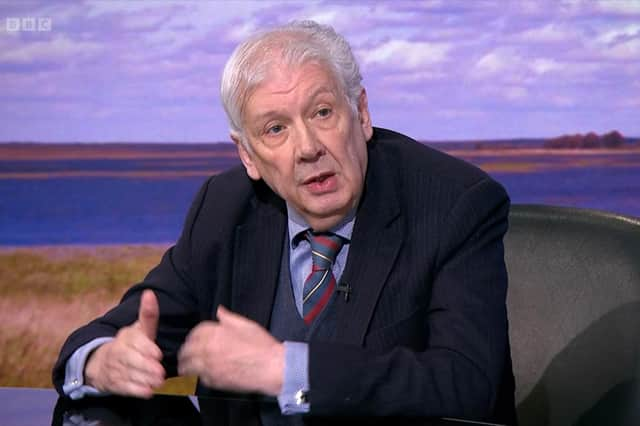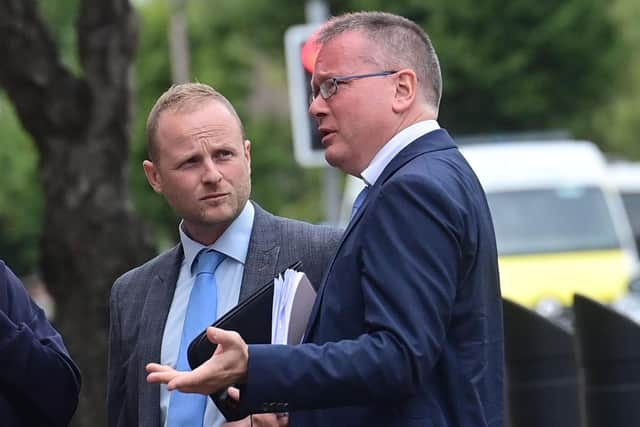War of words between Lord Bew and Jamie Bryson over the Windsor Framework and whether the DUP seven tests should mean a return to Stormont


Lord Bew, who was an academic at Queen’s University in Belfast and who was once an advisor to David Trimble, appeared on BBC One Northern Ireland’s programme The Sunday Politics.
On it, Lord Bew was asked about arguments that he developed in the News Letter last week with fellow peer Lord Godson (click here to read it), in which they called on the DUP to return to Stormont alongside the implementation of the framework, which was unveiled in January and which softened the Northern Ireland Protocol.
Advertisement
Hide AdAdvertisement
Hide AdHe reiterated this message and accused Mr Bryson of “rhetoric” in his response to the article. Mr Bryson then hit back, and said that the BBC should have mentioned that Lord Bew’s son is a Downing Street advisor.


Lord Bew and Lord Godson, who runs the influential Westminster think-tank Policy Exchange, wrote: “The most successful unionist leaders of Northern Ireland have always understood the need to work with the grain of imperfect arrangements bequeathed to them by British governments — which did not always appear to have unionists’ best interests at heart.”
They asked “is the present unionist leadership up to this perennial challenge?”
On yesterday’s programme, Lord Bew said it was important to accept that the framework was “highly imperfect”, not so much for consumers and citizens, whose “position is enhanced considerably by the Windsor Framework” but for businesses such as hauliers. He then cited something that a senior Irish official had said when appearing alongside him before Westminster’s Northern Ireland Affairs committee: “Implementation is negotiation. And he was making the point with reference to 1998.”
Advertisement
Hide AdAdvertisement
Hide AdLord Bew said there were remaining issues, the most pressing of which raised by the DUP is veterinary medicines. “These things still have to be resolved,” he said. “My argument would be, especially with the Stormont brake which has to be tested to see how good it is, but which nonetheless undoubtedly allows unionists to make a hullabaloo about something that they regard as unfair, my argument is that … it is far better to be inside than outside.”
Lord Bew also pointed out that the DUP’s seven tests did not state tests which unionists have been talking recently, such as EU law. “If you were really fighting on that point, you really would have mentioned it in the seven tests.”
Mark Carruthers, the Sunday Politics presenter, cited an article in the News Letter on Friday in which Baroness (Kate) Hoey accused him and Lord Godson as “falling for the government spin” (click her for Baroness Hoey’s letter). Lord Bew said they had in fact tried to be fairly objective about what the Windsor Framework does and does not deliver.
Mr Carruthers then cited an article that Jamie Bryson had written in response to the Bew-Godson News Letter article (click here for that Jamie Bryson response).
Advertisement
Hide AdAdvertisement
Hide Ad“That is just rhetoric. I mean it is just flying words.” Lord Bew said that his joint article had not said there was no problem with the framework. "What do unionists do about their then isolation, which is extremely dangerous politically? ... Just being thran, saying it is not fair, that is not a political strategy.”
Mr Bryson then replied with an open letter to Lord Bew, saying that his comment that Mr Bryson had engaged in “rhetoric” and “flying words” failed “to grapple with any of the contentions set out in the response, in a respectful and considered manner”.
He said: “It is a point of note, which respectfully I feel the BBC failed to appropriately declare, that your son is a senior advisor in Downing Street who was deeply involved in the construction of the Windsor Framework.
“Whilst I do not, for one moment, suggest there is anything wrong with this, other than the flaws in the framework, or that there is any incapability of dividing your views from that of your son, it does at least raise an ‘apparent’ (if not actual) bias point.
Advertisement
Hide AdAdvertisement
Hide Ad“I do feel that there is a potential issue when a parent, especially someone as eminent and respected as yourself, uses their good offices – at a point of significant constitutional controversy and I would suggest peril – to promote a political agreement in which their son was a key architect of at least some parts of it, without family link to the impugned Agreement being declared by those platforming such contributions.
“Those considering these contributions to the debate, and the timings of the interventions, ought to at least be aware of that issue.
Taking Lord Bew’s points in turn, Mr Bryson said: “Firstly, you contended (repeatedly) that the issue of EU law is not part of the DUP’s seven key tests, and appeared to suggest this had somehow appeared only recently. This is demonstrably untrue because I shared platforms with the DUP leader over a year ago in which both he and I expressly raised this issue, and indeed Sir Jeffrey- prior to the Framework- also made this point explicitly in Parliament.”
He said that it was also flagged as a key issue in a paper he co-wrote along with others including Martin Howe KC and Christopher Howarth of the ERG.
Advertisement
Hide AdAdvertisement
Hide Ad"This paper was endorsed by the DUP and provided to Downing Street (prior to the Framework) via two distinct channels. There is no-one in Number 10 who can claim that the issue of EU law was some kind of surprise.”
Mr Bryson went on: “Notwithstanding that, your assertion is plainly erroneous by virtue of simply reading the first of the DUP’s seven key tests. It requires the restoration of Article VI of the Acts of Union.
“The breach of Article VI is caused, most egregiously, by the continued application of EU law. There is no need to take my word for it, it was set out by at first instance Colton J at paragraph [64] of Allister et al [2022] NIQB 64, which was later endorsed by McCloskey LJ in his concurring judgment in the Court of Appeal at paragraphs [325]-[327].”
He added: “Secondly, and somewhat confusingly, you suggested ‘…Article VI [of the Acts of Union] is gone’ by referring to the initial territorial extent referring to Ireland, rather than Northern Ireland. This can be shown to be fundamentally wrong by again simple reference to the Allister et al case in which at all levels (High Court; Court of Appeal and Supreme Court) it was held that Article VI of the Acts of Union remains in force.
Advertisement
Hide AdAdvertisement
Hide Ad“However, the complete and irrefutable answer to your assertion is provided by Statutory Rules and Orders, 1923, No. 405. The Irish Free State (Consequential Adaption of Enactments) Order, 1923 the effect which is to provide those references – in every previous enactment – to Ireland are to be read as excluding Southern Ireland, and thus as Northern Ireland.
“Article VI of the Acts of Union remains firmly in force, every bit as much as Article III which is the statutory basis for Parliament itself.”
Mr Bryson also said: “Thirdly, you suggested the Acts of Union issue could be resolved by a statutory instrument. This is not so because the ‘subjugation and suspension’ of the Acts of Union comes about because of the all-conquering nature of section 7A of the European Union (Withdrawal) Act 2018. In order therefore to reverse this, primary legislation would be required.”
Mr Bryson added: “Fourthly, you postulated that sovereignty was not impinged by the Windsor Framework. It is true to say that Parliament – which voted on a limited aspect of the Framework which was otherwise concluded by the government in exercise of the prerogative power – may support the framework, and thus surrendering sovereignty over one part of the Union, and that therefore the inference being that if it is a sovereign choice to dilute your own sovereignty this is a different matter.”
Advertisement
Hide AdAdvertisement
Hide AdHe continued: “It seems you squarely suggest that the Windsor Framework does not dilute the sovereignty of the United Kingdom. This is again demonstrably false. The Stormont brake is subject to arbitration proceedings pursuant to Article 175 of the Withdrawal Agreement. Thus, if an arbitration ruling went against the UK, then as a matter of not purely international but in fact domestic law, the relevant EU law would apply without more. That is plainly inconsistent with sovereignty.”
And he said: “Fifthly, the omnibus point you appear to make is that the Windsor Framework is imperfect, but that nevertheless unionism should not only endure it, but assist in the infliction of these wounds upon ourselves.
“I do have to question why it always ought to be unionism that must compromise and concede, based on the somewhat illogical theory that the best way to save the Union is to consistently assist in its incremental dismantling.”
He said: “As I made clear in my response, and previously in our exchange of articles in the News Letter after the Supreme Court judgment (click here to read Jamie Bryson’s response to Lord Bew then), I have deep respect for your work and always listen attentively to your considered contributions, much of which I find value and agreement in.”
Advertisement
Hide AdAdvertisement
Hide AdMr Bryson said: “It is my sincere hope you will consider the points raised, and if you find them disagreeable that you will respond – publicly – and explain why you say that which I have put forward is incorrect.”